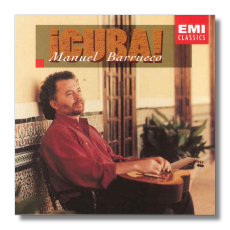
The Internet's Premier Classical Music Source
Related Links
- Latest Reviews
- More Reviews
-
By Composer
-
Collections
DVD & Blu-ray
Books
Concert Reviews
Articles/Interviews
Software
Audio
Search Amazon
Recommended Links
Site News
 CD Review
CD Review
¡Cuba!

Manuel Barrueco Performs the Work of Cuban Musicians
- Ernesto Lecuona: La Comparsa, Danza Lucumi, à la Antigua
- Leo Brouwer: Preludio, Rito de los Orishas
- Carlos Fariñas: Cancion Triste
- Enrique Ubieta: New York Rush
- Hector Angulo: Canots Yoruba de Cuba
- José Ardevol: Sonata for Guitar
Manuel Barrueco, guitar
EMI 56757 2
This understated CD impresses me both for what it is and what it is not. ¡Cuba! is filled with the subtle guitar talents of Manuel Barrueco. He plays Hector Angulos' Cantos Yoruba de Cuba with a gentle mastery. This cycle is based on seven songs of the Yoruba people, who came to Cuba as slaves from Nigeria. The short songs are often slow with complex melodies that, once stated, dissolve into the mist. Ardevol's Sonata for Guitar is a more forceful piece with muscular chords competing with graceful Cuban triplets. The middle movement is a set of charming variations on a guajira, a Cuban country dance. You can almost picture the dancers spinning about in long skirts and wobbly straw hats.
Brouwer's two works on this CD, his Preludio and Rito de los Orishas ("Rite of the Goddesses") are interesting contrasts in an artist's growth. Preludio (Suite #2), composed in his teens, is lyrical, sweet, and filled with youthful longing. Rito de los Orishas is more in the modern vein, with choppy rhythmic progressions and arrhythmic takseems while the demons are vanquished and tenuous melodies as the people celebrate in three abstract dances.
¡Cuba! is not particularly dazzling. Barrueco doesn't play tour de force showcase pieces, nor does he draw attention to himself by choosing works only for complicated chord shifts and fancy finger picking. Lecuona's Afro-Cuban dance pieces, composed earlier in the century, are pure examples of folk art that Barrueco plays straight, without heavy stylistic innovations. It is not stirring or thrilling music, at least not the same way that guitar works by Paganini or Villa-Lôbos are. Nor do melodies linger in your head after you've heard them. However, this is not drive time or background music. The pieces are too highly crafted for such low levels of attention. They successfully create the moods they intend and are ideal for workday decompression, quiet candlelit dinners, and if you're lucky, lovemaking.
Copyright © 1999, Peter Bates


















